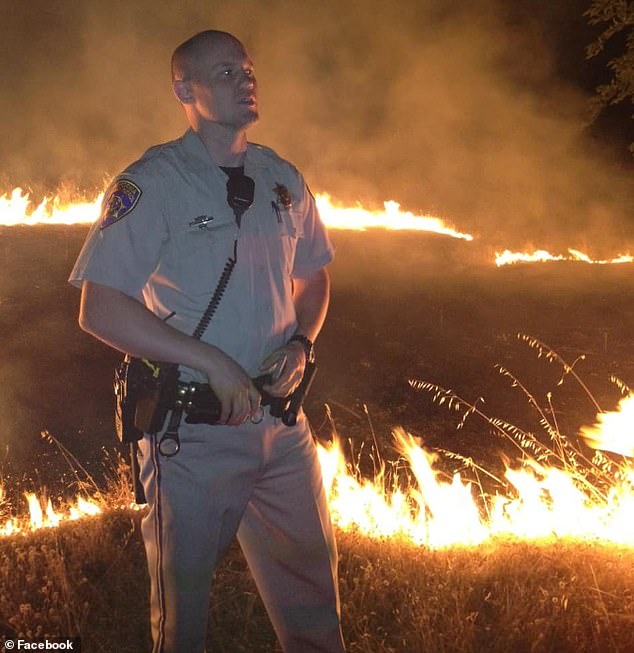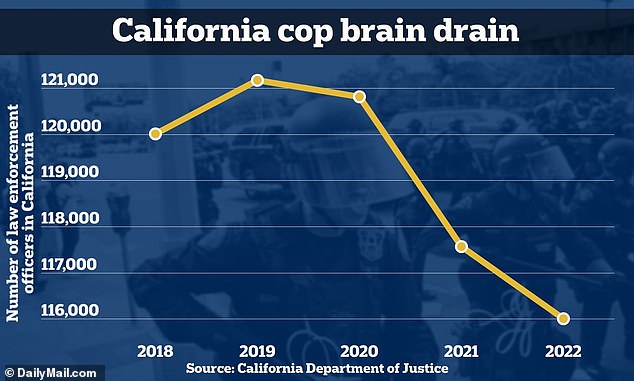I was ashamed of telling people I was a cop in California – so I moved to this Republican state where I’ve never been happier, says police officer
A former California Highway Patrol officer who retired to Idaho says he has never been happier after previously avoiding telling strangers what he did for a living.
Seth Horst left the Golden State and his law enforcement career to move with his family to Coeur d’Alene, Idaho, in 2020.
After starting a real estate business in North Idaho, Horst said he couldn’t believe how much support for law enforcement he saw.
Horst said Fox news that the term police officer felt like a four-letter word when he had lived and worked in the Democratic stronghold state.
While attending the Independence Day celebration in Coeur d’Alene, he was impressed by the support for local law enforcement.
Seth Horst, pictured here, left the Golden State and his career in law enforcement to move with his family to Coeur d’Alene, Idaho, in 2020

When he attended the Independence Day celebration in Coeur d’Alene, he was blown away by the support for local law enforcement, as seen here
Horst told the outlet that the Kottenai County sheriff was part of the parade, waving at residents from a pickup truck with a revolver against his hip.
Cars, homes and businesses in the city also display the blue line flag year-round as a show of solidarity with officers.
According to Horst, it is not unusual for people to offer to buy coffee for the police when they see them on the street.
He told the newspaper: ‘It’s so powerful that the men and women in uniform here have that support. It’s a pretty phenomenal place to do this work.”
Horst and his wife Kristen left the state because they felt they were losing freedoms in medical care and what was taught in schools.
He added, “My wife was really pushing, like, ‘Hey, we gotta get out of here because California doesn’t feel safe anymore.
“We felt like we were losing a lot of our freedoms in terms of medical freedom and choosing where our kids went to school, what happened at school, things like that.”
According to Horst, the area has become a haven for retired officers like him who are looking for a better way of life.
In a post on his social media, Horst said he retired due to an injury while on duty that prevented him from wearing his duty belt and sitting for long periods of time.

Horst and his wife Kristen, seen here, left the state because they felt they were losing freedoms in medical care and what was taught in schools

In a post on his social media, Horst said he retired due to an injury while on duty

Horst said the Kottenai County sheriff was part of the Fourth of July parade, waving at residents from a pickup truck with a revolver against his hip. A photo of last year’s parade can be seen here
He continued, “Based on my own experience with the number of people I meet with that background, this is the largest concentration of former first responders than anywhere else in the US.
“In the 1970s, LAPD officers started showing up after retirement. So I think this put that on the map. That just became a thing.
“There’s a lot of officers from LAPD, San Diego County, Sheriff’s Department that found their way here.
“There are certainly people who are unhappy where they work now, who love their job and find that no matter what state or city they work in, they can’t do the job.
“The public prosecutor does not support them, there is too much liability, so the ministry does not allow them to enforce the law, which is their job. And that irritates a lot of people
“They get a job here and often take a huge pay cut because the pay here doesn’t compare to many other states.
“But it’s worth it for them to raise their family in a place that’s safe and has old-fashioned values.”
Bryan Lovell, president of the Idaho Fraternal Order of Police, told the newspaper, “They come to Idaho where they can enjoy their careers and make a difference.
“They see that our communities are very supportive of law enforcement and public safety.”
Cities across the country suffered staff shortages due to widespread anti-police protests in 2020.
Lovell said Idaho has not been immune to the recruiting challenges; they saw an increase in out-of-state police requests around that time.
The number of out-of-state officers doubled between 2019 and 2021, and while applications have declined, they still remain above pre-2020 levels.
In addition to Idaho, officers in California are also fleeing to Texas to escape soft-on-crime policies that they say have made their work “pointless.”
Senior officials up to and including department heads have attacked state lawmakers, claiming that a succession of “anti-law enforcement” policies have made their jobs impossible.
Overworked and unsupported, they have instead taken jobs in Texas and other states seen as tough on crime.
Evan Leona, 38, who left his job as a detective in a multi-agency gang unit in Fresno, California, in 2022 to work for the Denton Police in Texas, said he met “over a hundred officers” in the Dallas/Fort Worth area who had fled California.

The number of law enforcement officers in California has dropped by more than 5,000 since 2019
“Five officers from different agencies in California came just during my shift in Denton,” he told DailyMail.com. ‘The legal system just works a lot better here.’
It comes at a time when the Golden State is bleeding thousands of police officers every year, with the number dropping by more than 5,000 since 2019.
There are now fears that high-crime California cities are experiencing a brain drain in law enforcement, leaving the public unprotected as criminals rise up.
Many in law enforcement blame controversial legislation, including Proposition 47 and 57, for turning prisons into revolving doors and endangering their lives.
Liberal politicians have steadfastly defended their policies, arguing that they have been misinterpreted and wrongly blamed for rising crime.
They say the aim of the reforms was to ease pressure on the state’s overcrowded prisons and refocus police efforts on more serious crimes.
Regardless, their efforts seem deeply unpopular among many patrolling the streets.
